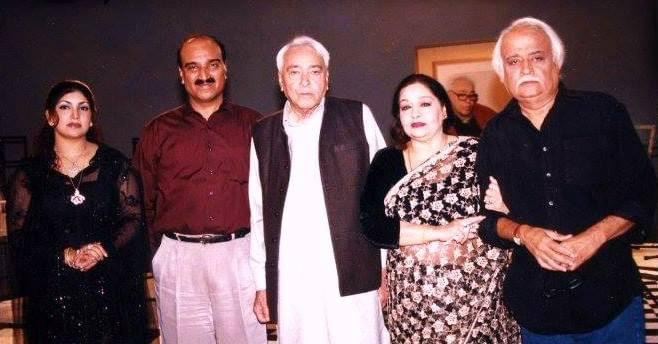Written by: Mahnoor Fatima
Posted on: September 23, 2020 |  | 中文
| 中文
Farida Khanum at PTV
Even in her old age, her presence inspires awe and reverence from all, as audiences gather to watch and listen. When Farida Khanum sings of love in her rich and melancholy voice, people invariably stop to listen. Known as Malika-e-Ghazal (The Queen of Ghazal) in both Pakistan and India, Khanum has dedicated her life to honing the musical, technical and literary complexities of ghazal singing. Her life and career have proven to be an extraordinary example of how talent and hard work can come together to move people across borders and generations.
Khanum was born in 1939 in Calcutta, British India, and shifted to Amristar at a young age. By then her sister, Mukhtar Begum, already established herself as an artist of tremendous beauty and talent. Khanum began to sing at the age of seven, following in her sister’s footsteps. The family shifted to Lahore in modern-day Pakistan when Khanum was 18. Growing up, Khanum was not too fond of studying, but attributes her range and discipline to her teacher, Ustad Ashiq Ali Khan of the Patiala Gharana.
In interviews, she explained that her riyaaz (classical music practice) would last up to 4 hours a day, perfecting the modulations, pitch, notations and breathing. She was trained in the singing styles of ghazal, Khayal, Thumri and Dadra, and continued to be deeply devoted to her riyaaz. With the help of her unique singing skills, creative upbringing, and the overall culture of singing in mehfils (gatherings), success was inevitable. After declining film roles (due to the long and hectic schedules), she began to sing in competitions at age 20, and found her way to Radio Pakistan.
For much of her career, Khanum remained committed to ghazal singing, and has been closely associated with national broadcasting channels like Radio Pakistan and Pakistan Television. She began her career among Radio Pakistan sensations like Mehdi Hassan, Nusrat Fateh Ali Khan and Reshma, guided by producers who understood the craft of the ghazal, like the great Zulfiqar Ali Bukhari, the channel’s first Director-General.

(L to R) Singer Sahira Naseem, Khawaja Najam Hasan, Poet Munir Niazi, Farida Khanum and Anwar Maqsood
There was no room for error, as there were no second takes in radio broadcastings. However, she recalled the commitment and camaraderie of classical singers which the producers fostered through regular ‘mehfil-e-shab’ (night gatherings), when artists would come together and sing from evening till dawn the next day.
Her famous performance for Ayub Khan, and the government’s patronage of the arts in the 1960’s, allowed her to gain countrywide success. Khanum received a Pride of Performance Award in 1970, and transitioned easily from radio to television screens. She also began to release albums and live performances from 1978 onwards.
Meanwhile, Pakistani radio signals used to reach all the way to India, and ghazal enthusiasts were immediately enraptured by her singing. Khanum felt a deep connection to Amristar and Calcutta because of her childhood, and would often perform on the other side of the border, especially at Ghalib’s mausoleum in Old Dehli. She also sang briefly in Afghanistan along with Pashto and Persian artists, to audiences who enjoyed her craft without necessarily understanding the lyrics.
While words and enunciation are equally important to the ghazal, her use of melody has the power to amplify the depth of the poetry and its meaning. Fans are not only struck by the incredible range she uses to convey a diverse set of emotions, but the careful reflection of Raag (melody) she selects to reach out to the listener’s heart. Through her meticulous technique, she created an intimate but impactful relationship with her listeners, and her songs would often stay with them long after the performance.
Perhaps her most popular ghazal, one which she has continued to sing and be associated with, has been ‘Aaj Jaane ki Zidd Na Kero’ (Don’t Insist on Leaving). She heard the song at a gathering, and fell in love with it, making it her own by performing it everywhere. Written by poet Fayyaz Hashimi and composed by Sohail Rana, this iconic ode to love and longing, with its beautiful melody and poignant lyrics, continues to bewitch audiences of all generations. And Khanum’s honey-soaked voice only added to the magic of the song. After a long hiatus, Khanum returned to perform this song for the public, when she sang the song for Coke Studio in 2015.
In recent years, Khanum has lamented the lack of ghazal singers and songs released in the mainstream. During a performance at the Lahore University of Management Sciences (LUMS) in 2018, she explained, “Now, it’s about making the song as fast as possible and getting your payment for it. I feel like there is not much to a song these days, you can’t feel the sur (tone), shayer ka dard (the poet’s pain) in the song delivery.”
She attributes this to many reasons, firstly the lack of skilled musical teachers who could train the next generation of ghazal singers, secondly the lack of commitment to the discipline of classical singing, and thirdly a lack of understanding the various dimensions of Urdu language that is used in the ghazal. For her, the solution is to bring together like-minded people who appreciate classical singing. She is a strong proponent of cultural events and gatherings, where people could come together to keep the craft alive.
Khanum represents not only a talent that is difficult to reproduce, but an era of Pakistan and India’s history when ghazal singing was understood and appreciated by many. Her commitment to her craft and her grasp of the emotional complexities of the ghazal genre, has allowed her to leave an impact on listeners of every generation. One way to honor her contributions is to heed her suggestion, and continue to keep classical eastern singing alive through discussion and performance.
All photo credits go to Farida Khanum.
You may also like: